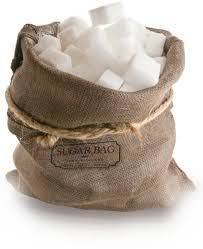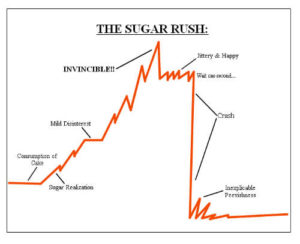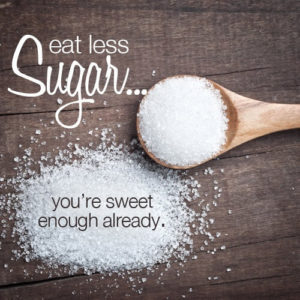What does Sugar do in our body and why should we restrict it?
First of all what is Sugar? Straight from Google :-)!
sugar
-
1.a sweet crystalline substance obtained from various plants, especially sugar cane and sugar beet, consisting essentially of sucrose, and used as a sweetener in food and drink.“a spoonful of sugar”
-
2.BIOCHEMISTRYany of the class of soluble, crystalline, typically sweet-tasting carbohydrates found in living tissues and exemplified by glucose and sucrose.
-
1.sweeten, sprinkle, or coat with sugar.“Mother absent-mindedly sugared her tea”
-
2.make more agreeable or palatable.“the novel was preachy but sugared heavily with jokes”
Sugar has also been described as this amazing substance that makes the world a better place, Also everything tastes terrible without sugar and did i mention that coffee wouldn’t even exist without sugar.
How unproductive would the world be with no coffee! Really the people who harvest and manufacture sugar should be give a national award for their public service right!?
Google seemed to leave these important facts out of their definition.
The bag of Sugar that we typically know is actually sucrose. Sucrose consists of two different types of simple sugars – fructose and glucose. Glucose and fructose are what we are going to be talking about today.
What do our bodies use glucose and fructose for?
It’s food right? Thats why we eat it, thats why we crave it, thats why we seem to NEED it. It tastes good, so the body must be able to utilise its components for something. We wouldn’t eat or drink an industrial strength cleaner, like coca cola, would you? So what exactly is the purpose of this blissful substance that we are so attached too.
Glucose is the main source of energy for our cells and once in the blood stream can be utilised by the body immediately. It plays an important role in everything from powering your brain to providing the fuel for your muscles to work. If you have an excess of glucose in your blood or not enough this can be dangerous to your health (think diabetes which is when you are unable to manage your own blood sugar levels). Your body then requires insulin to transport glucose to specific cells for use as energy or, if in excess, to be stored as body fat. Also when we get a hit of glucose it lights up dopamine receptors in your brain and make you feel happy! Good old dopamine, he is everyone’s favourite. We can definitely understand why you have a deep desire for it!
If you get a really big hit of glucose at one time you will have a very big insulin response to process the glucose. Whilst the glucose is high in your blood you are up and about, excited about life and full of energy. For example have you ever seen a 4 year old after a glass of soft drink or after eating a lolly bag? Those guys are insane they are like a ping pong ball with the velocity of a tornado! Insulin secreted from your pancreas then comes in quickly to decrease blood sugar levels. The large insulin response will trigger what we know as a sugar crash, you know that moment when you see the 4 year old rip the last book off the book shelf and then go into a unstoppable, unreasonable, temper tantrum for 7 minutes and then nap for 2 hours! This definitely happens to all of us we are just more equipped with skills to deal with the emotions but trust me the highs and lows are still there! The graph below (cheers Google images) sums it up well.
Fructose on the other hand has the sneaky ability to be processed by the body without the need for insulin, it is absorbed in your small intestine and then passes through the liver and from there it is free to be used by the body. You will not experience the sugar high or low with fructose, instead it will just slip into your cells and in excess be stored as fat. Research is being done at the moment on fructose because it is believed that your body can consume large amounts of fructose without feeling full or satisfied. You can imagine how this is affecting your body. Remember with sucrose you are getting both of these simple sugars in one hit.
Another big issue with consuming large amounts of sugar at one time is if you have a high sugar diet you will have mood swings and decreased energy levels with the highs and lows, the addiction lies in the fact that when we crash we feel terrible, and what makes us feel good? More SUGAR! It will pick your mood back up and give you instant energy again, and the cycle starts again.
Warning all of the following will have the same impact on your body – maple syrup, honey, white sugar, brown sugar, molasses, high fructose corn syrup. Honey does have the benefit of some minerals and fibre but you do not want to consume it in high amounts.
So I know what your thinking we have a problem – we need sugar but we don’t want to store fat and have sugar crashes.
How do we get the glucose we need for that all important brain function?
The way we are meant to get glucose into our body is through metabolising carbohydrates. These come in the forms of grains, vegetables and fruits (I am sorry no snickers bars and red frogs are not on the list!). Another huge benefit to eating these foods is that we also get a stack of vitamins, minerals and fibre from these as well as the carbohydrates. If you look at a can of soft drink you get, sugar, some chemicals that we don’t know what they do to our body, and some sugar (because of the compounds in the drink it won’t even hydrate you, you still need to drink water anyway).
Tim, I am convinced! How much sugar should I limit myself per day!
This is where it gets fun and no wonder we are all confused!
In my research I came up with a few different numbers.
If you are an American it is recommended by the American Heart Foundation that you have 5-9 teaspoons of sugar per day.
The World Health Organisation (WHO) is looking at revising their recommendation from 10% (About 12 teaspoons of sugar) of your diet down to 5%.
Australians however according to the Dieticians Association of Australia recommend 22.5 teaspoons for the average adult! (WHAT!!! I hope this is also up for revision).
European Food Information Council follows WHO’s recommendations.
A final thought!
If you’re looking to lose weight, have more energy, more focus and overall better health restrict your sugar intake in the body. If you relapse and have a binge once in a very long while you are going to be ok but be mindful of the effects that sugar could be having on your body, on your moods and on your overall performance!
Stay Awesome
Tim Morgan
Mobile Personal Training Specialist
4 U Body Fitness





